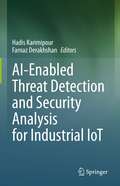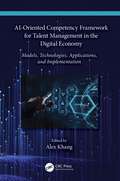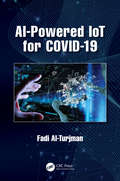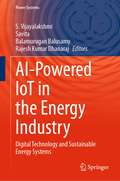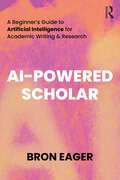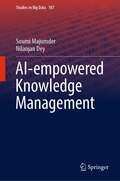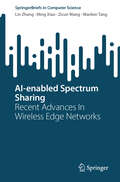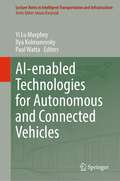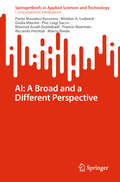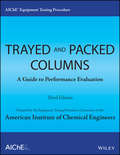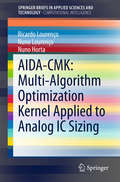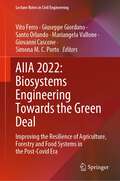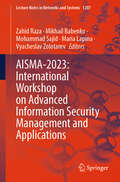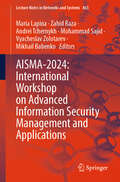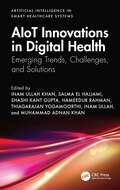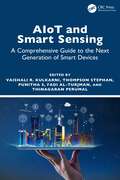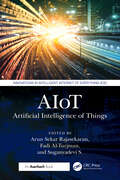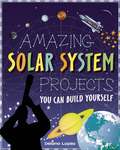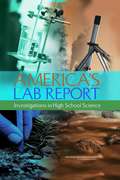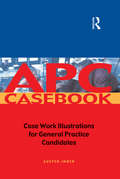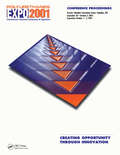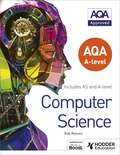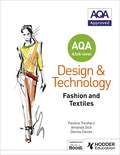- Table View
- List View
AI-Enabled Threat Detection and Security Analysis for Industrial IoT
by Hadis Karimipour Farnaz DerakhshanThis contributed volume provides the state-of-the-art development on security and privacy for cyber-physical systems (CPS) and industrial Internet of Things (IIoT). More specifically, this book discusses the security challenges in CPS and IIoT systems as well as how Artificial Intelligence (AI) and Machine Learning (ML) can be used to address these challenges. Furthermore, this book proposes various defence strategies, including intelligent cyber-attack and anomaly detection algorithms for different IIoT applications. Each chapter corresponds to an important snapshot including an overview of the opportunities and challenges of realizing the AI in IIoT environments, issues related to data security, privacy and application of blockchain technology in the IIoT environment. This book also examines more advanced and specific topics in AI-based solutions developed for efficient anomaly detection in IIoT environments. Different AI/ML techniques including deep representation learning, Snapshot Ensemble Deep Neural Network (SEDNN), federated learning and multi-stage learning are discussed and analysed as well. Researchers and professionals working in computer security with an emphasis on the scientific foundations and engineering techniques for securing IIoT systems and their underlying computing and communicating systems will find this book useful as a reference. The content of this book will be particularly useful for advanced-level students studying computer science, computer technology, cyber security, and information systems. It also applies to advanced-level students studying electrical engineering and system engineering, who would benefit from the case studies.
AI-Oriented Competency Framework for Talent Management in the Digital Economy: Models, Technologies, Applications, and Implementation
by Alex KhangIn the digital-driven economy era, an AI-oriented competency framework (AIoCF) is a collection to identify AI-oriented knowledge, attributes, efforts, skills, and experiences (AKASE) that directly and positively affect the success of employees and the organization. The application of skills-based competency analytics and AI-equipped systems is gradually becoming accepted by business and production organizations as an effective tool for automating several managerial activities consistently and efficiently in developing and moving the capacity of a company up to a world-class level.AI-Oriented Competency Framework for Talent Management in the Digital Economy: Models, Technologies, Applications, and Implementation discusses all the points of an AIoCF, which includes predictive analytics, advisory services, predictive maintenance, and automated processes, which help to make the operations of project management, personnel management, or administration more efficient, profitable, and safe. The book includes the functionality of emerging career pathways, hybrid learning models, and learning paths related to the learning and development of employees in the production or delivery fields. It also presents the relationship between skills taxonomy and competency framework with interactive methods using datasets, processing workflow diagrams, and architectural diagrams for easy understanding of the application of intelligent functions in role-based competency systems. By also covering upcoming areas of AI and data science in many government and private organizations, the book not only focuses on managing big data and cloud resources of the talent management system but also provides cybersecurity techniques to ensure that systems and employee competency data are secure.This book targets a mixed audience of students, engineers, scholars, researchers, academics, and professionals who are learning, researching, and working in the field of workforce training, human resources, talent management systems, requirement, headhunting, outsourcing, and manpower consultant services from different cultures and industries in the era of digital economy.
AI-Powered IoT for COVID-19
by Fadi Al-TurjmanThe Internet of Things (IoT) has made revolutionary advances in the utility grid as we know it. Among these advances, intelligent medical services are gaining much interest. The use of Artificial Intelligence (AI) is increasing day after day in fighting one of the most significant viruses, COVID-19. The purpose of this book is to present the detailed recent exploration of AI and IoT in the COVID-19 pandemic and similar applications. The integrated AI and IoT paradigm is widely used in most medical applications, as well as in sectors that deal with transacting data every day. This book can be used by computer science undergraduate and postgraduate students; researchers and practitioners; and city administrators, policy makers, and government regulators. It presents a smart and up-to-date model for COVID-19 and similar applications. Novel architectural and medical use cases in the smart city project are the core aspects of this book. The wide variety of topics it presents offers readers multiple perspectives on a variety of disciplines. Prof. Dr. Fadi Al-Turjman received his PhD in computer science from Queen’s University, Kingston, Ontario, Canada, in 2011. He is a full professor and research center director at Near East University, Nicosia, Cyprus.
AI-Powered IoT in the Energy Industry: Digital Technology and Sustainable Energy Systems (Power Systems)
by Balamurugan Balusamy Rajesh Kumar Dhanaraj Savita S. VijayalakshmiAI-Powered IoT in the Energy Industry: Digital Technology and Sustainable Energy Systems looks at opportunities to employ cutting-edge applications of artificial intelligence (AI), the Internet of Things (IoT), and Machine Learning (ML) in designing and modeling energy and renewable energy systems. The book's main objectives are to demonstrate how big data can help with energy efficiency and demand reduction, increase the usage of renewable energy sources, and assist in transitioning from a centralized system to a distributed, efficient, and embedded energy system. Contributions cover the fundamentals of the renewable energy sector, including solar, wind, biomass, and hydrogen, as well as building services and power generation systems. Chapters also examine renewable energy property prediction methods and discuss AI and IoT prediction models for biomass thermal properties.Covers renewable energy sector fundamentals;Explains the application of big data in distributed energy domains;Discusses AI and IoT prediction methods and models.
AI-Powered Scholar: A Beginner’s Guide to Artificial Intelligence for Academic Writing & Research
by Bron EagerThis book is a practical and comprehensive guide on using AI tools to streamline and optimise the academic writing and research process.Through a series of step-by-step instructions and practical tips, this book provides readers with the knowledge and tools they need to leverage the power of AI to produce high-quality academic publications. The text covers the historical context of AI development, techniques for communicating with AI systems, and strategies for transforming AI into helpful research assistants. Readers will discover the art of prompt engineering and learn practical applications for using AI to ideate research projects, conduct literature searches, and accelerate academic writing. Emphasis is placed on the responsible use of AI, positioning it as an extension of human capabilities rather than a replacement. Through real-world examples, complex AI concepts are demystified, and key challenges and limitations are addressed head-on.Whether you're a university student or a tenured professor, this book is your indispensable companion to beginning your path towards becoming an AI-powered scholar.
AI-empowered Knowledge Management (Studies in Big Data #107)
by Nilanjan Dey Soumi MajumderThis book is focused on AI-empowered knowledge management to improve processes, implementation of technology for providing easy access to knowledge and the impact of knowledge management to promote the platform for generation of new knowledge through continuous learning. The book discusses process of knowledge management which includes entirety of the creation, distribution, and maintenance of knowledge to achieve organizational objectives. It also covers knowledge management tools which enable and enhance knowledge creation, codification, and transfer within business firms thereby reducing the burden of work and allowing application of resources and effective usage towards practical tasks. An immense growth of artificial intelligence in business organizations has occurred and AI-empowered knowledge management practice is leading towards growth and development of the organization.
AI-enabled Spectrum Sharing: Recent Advances In Wireless Edge Networks (SpringerBriefs in Computer Science)
by Lin Zhang Ming Xiao Zicun Wang Wanbin TangWireless edge networks aim to provide last-mile wireless connections between access points and diversified wireless end devices. Recent years witness the rapid development of wireless communication ecosystems including fundamental theory breakthroughs, manufacture capability improvements, as well as the explosively increasing wireless end devices and service demands. It is known that spectrum is the irreplaceable resource for wireless transmissions in edge networks. Nevertheless, it is quite challenging and inefficient to allocate dedicated spectrum for each single transmission link due to the severe shortage of spectrum resource. Alternatively, by enabling different links to use the same spectrum, spectrum sharing is envisioned to be a promising paradigm to properly accommodate the conflict between the scarce spectrum resource and substantial spectrum demands. Conventionally, model-driven optimization methods are widely adopted to optimize the spectrum sharing policy in the edge network and achieve friendly coexistence among different transmission links. However, future wireless edge network is predicted to be large-scale and heterogeneous, model-driven optimization methods will be problematic such as imperfect modelling and unacceptable overheads. Different from the existing related books on spectrum sharing or spectrum management for wireless edge networks, our book leverages the artificial intelligence (AI) to achieve smart spectrum sharing for wireless edge networks and elaborates AI-enabled spectrum sharing technique in typical scenarios, which can guide the development of next-generation spectrum sharing standards, as well as provide innovative spectrum sharing methods for related practitioners, including research fellow, lecturers, and students.
AI-enabled Technologies for Autonomous and Connected Vehicles (Lecture Notes in Intelligent Transportation and Infrastructure)
by Ilya Kolmanovsky Yi Lu Murphey Paul WattaThis book reports on cutting-edge research and advances in the field of intelligent vehicle systems. It presents a broad range of AI-enabled technologies, with a focus on automated, autonomous and connected vehicle systems. It covers advanced machine learning technologies, including deep and reinforcement learning algorithms, transfer learning and learning from big data, as well as control theory applied to mobility and vehicle systems. Furthermore, it reports on cutting-edge technologies for environmental perception and vehicle-to-everything (V2X), discussing socioeconomic and environmental implications, and aspects related to human factors and energy-efficiency alike, of automated mobility. Gathering chapters written by renowned researchers and professionals, this book offers a good balance of theoretical and practical knowledge. It provides researchers, practitioners and policy makers with a comprehensive and timely guide on the field of autonomous driving technologies.
AI: A Broad and a Different Perspective (SpringerBriefs in Applied Sciences and Technology)
by Paolo Massimo Buscema Weldon A. Lodwick Giulia Massini Marco Breda Francis Newman Masoud Asadi-Zeydabadi Riccardo Petritoli Pier Luigi SaccoOne of the primary objectives of this book is to highlight the profound difference between two types of AI that pursue distinct goals: emulative AI, which seeks to build machines whose output is similar to, or even superior to, that of the human brain, and investigative AI, whose purpose is to make invisible information within data visible by uncovering the laws through which individual behaviors self-organize into collective behaviors. The former is better known, as it serves as a useful tool for automating human labor and generating market profits; the latter is less widely recognized but is more scientifically oriented towards saving lives (in the medical field), explaining otherwise inexplicable phenomena (in the geophysical field), and enhancing our understanding of the material and abstract world. Both are valuable yet distinct: the emulative approach generates immediate profits and creates illusions of human-like power, while the investigative approach enhances fundamental scientific research and will yield its greatest benefits over time. The investigative approach presented in this volume seeks to rebuild the bridge between humanity and nature.
AIChE Equipment Testing Procedure - Trayed and Packed Columns
by AicheThis new edition of a trusted guide combines and updates the best available field knowledge on both trayed and packed distillation columns. In one complete, user-friendly volume, it presents a compilation of techniques rather than a single set of compulsory steps, allowing readers to select the procedure that best suits their needs. With its engineer-tested procedures and detailed explanations, the third edition provides chemical engineers, plant managers, and other professionals with first-class advice on assessing and measuring performance for a variety of distillation column types in multiple applications.
AIDA-CMK: Multi-algorithm Optimization Kernel Applied To Analog Ic Sizing (SpringerBriefs in Applied Sciences and Technology)
by Nuno Horta Ricardo Lourenço Nuno LourençoThis work addresses the research and development of an innovative optimization kernel applied to analog integrated circuit (IC) design. Particularly, this works describes the modifications inside the AIDA Framework, an electronic design automation framework fully developed by at the Integrated Circuits Group-LX of the Instituto de Telecomunicações, Lisbon. It focusses on AIDA-CMK, by enhancing AIDA-C, which is the circuit optimizer component of AIDA, with a new multi-objective multi-constraint optimization module that constructs a base for multiple algorithm implementations. The proposed solution implements three approaches to multi-objective multi-constraint optimization, namely, an evolutionary approach with NSGAII, a swarm intelligence approach with MOPSO and stochastic hill climbing approach with MOSA. Moreover, the implemented structure allows the easy hybridization between kernels transforming the previous simple NSGAII optimization module into a more evolved and versatile module supporting multiple single and multi-kernel algorithms. The three multi-objective optimization approaches were validated with CEC2009 benchmarks to constrained multi-objective optimization and tested with real analog IC design problems. The achieved results were compared in terms of performance, using statistical results obtained from multiple independent runs. Finally, some hybrid approaches were also experimented, giving a foretaste to a wide range of opportunities to explore in future work.
AIIA 2022: Improving the Resilience of Agriculture, Forestry and Food Systems in the Post-Covid Era (Lecture Notes in Civil Engineering #337)
by Vito Ferro Giuseppe Giordano Santo Orlando Mariangela Vallone Giovanni Cascone Simona M. C. PortoThis volume gathers the latest advances, innovations, and applications in the field of biosystems engineering, as presented at the 12th Conference of the Italian Association of Agricultural Engineering (AIIA), held in Palermo, Italy, on September 19-22, 2022. Focusing on the challenges of improving the resilience of agriculture, forestry and food systems in the post-Covid era, it shows how the research has addressed the following topics: Monitoring and modelling hydraulic and hydrological processes in agriculture and forestry systems; Challenges in stream rehabilitation and soil conservation strategies; Sustainable water resource management under climate change scenarios; Planning safe, healthy and resilient territorial, built and green systems; Cultural heritage preservation and rural landscape protection, planning and management; Plant and livestock production processes and technologies. Healthy and Organic farming. Animal welfare; Energy, waste and by-products smart use; Post-harvest logistics and food chain structures technology; Applications and experiences in smart agriculture and forestry; One Health, management and standardization for agriculture and forestry machinery and structures; Big data, machine learning and data hub in biosystems engineering. The contributions were selected by a rigorous peer-review process, and offer an extensive and multidisciplinary overview of the research in the field of biosystems engineering for sustainable agriculture.
AISMA-2023: International Workshop on Advanced Information Security Management and Applications (Lecture Notes in Networks and Systems #1207)
by Zahid Raza Mikhail Babenko Mohammad Sajid Maria Lapina Vyacheslav ZolotarevThis book is based on the best papers accepted for presentation during the AISMA-2023: International Workshop on Advanced in Information Security Management and Applications on September 29 - October 1, 2023 in online mode at Stavropol, Krasnoyarsk, Russia. The book includes research on information security problems and solutions in the field of information security management, blockchain and cryptography, anomalies activity detection, authentication and key distribution, digital forensics. The scope of research methods in information security management presents original research, including mathematical models and software implementations, related to the following topics: social activities quality, blockchain technology, anomaly detection in wireless sensor networks, DDoS attack detection, incident regulation and trust assessment. In addition, some papers focus on dynamics risks infrastructural genesis at critical information infrastructure facilities. Finally, the book gives insights into some problems using blockchain technology in various applications. The book intends for readership specializing in the field of information security management and applications, information security methods and features.
AISMA-2024: International Workshop on Advanced Information Security Management and Applications (Lecture Notes in Networks and Systems #863)
by Zahid Raza Andrei Tchernykh Mikhail Babenko Mohammad Sajid Maria Lapina Vyacheslav ZolotarevThis book is based on the best papers accepted for presentation during the AISMA-2024: International Workshop on Advanced in Information Security Management and Applications. The book includes research on information security problems and solutions in the field of security awareness, blockchain and cryptography, data analysis, authentication and key distribution, security incidents. The scope of research methods in information security management presents original research, including mathematical models and software implementations, related to the following topics: describing security incidents, blockchain technology, machine learning-based approaches in wireless sensor networks, phishing attack response scenarios, biometric authentication, information security audit procedures, depersonalization process. In addition, some papers focus on dynamics risks infrastructural genesis at critical information infrastructure facilities. Finally, the book gives insights into the some problems in forecasting the development of information security events. The book intends for readership specializing in the field of information security management and applications, information security methods and features.
AIoT Innovations in Digital Health: Emerging Trends, Challenges, and Solutions (Artificial Intelligence in Smart Healthcare Systems)
by Inam Ullah Khan Shashi Kant Gupta Inam Ullah Salma El Hajjami Hameedur Rahman Thiagarajan Yogamoorthi Muhammad Adnan KhanArtificial Intelligence (AI) innovations in digital health offer unprecedented opportunities to facilitate human health and provide tools and techniques that reduce overall costs. This book discusses the use of AI to improve diagnostic accuracy, patient monitoring, the use of remote diagnostic tools, identification of life-threatening diseases, medical robotics applications, drug discovery, technology-driven solutions, and much more.AIoT Innovations in Digital Health: Emerging Trends, Challenges, and Solutions presents integrated technologies such as Green Computing, IoT, and Big Data using AI, Machine Learning, Deep Learning, and Federated Learning for Healthcare. It discusses the future of medical robotics using Machine Learning and highlights the use of Federated Learning-based patient monitoring applications. This book also elaborates on the role that AI and Machine Learning play in drug discovery.Interested readers will include anyone working in or involved in smart healthcare research which includes, but is not limited to, healthcare specialists, computer science engineers, electronics engineers, systems engineers, and pharmaceutical practitioners.
AIoT and Smart Sensing: A Comprehensive Guide to the Next Generation of Smart Devices
by Fadi Al-Turjman Thinagaran Perumal Thompson Stephan Vaishali R. Kulkarni S PunithaAIoT and Smart Sensing: A Comprehensive Guide to the Next Generation of Smart Devices offers an in‑depth exploration of the intersection of Artificial Intelligence of Things (AIoT) and smart sensing technologies. As the convergence of AI and IoT reshapes industries, this book serves as an essential guide for understanding the technological foundations, security protocols, and wide‑ranging applications that make AIoT a transformative force. By examining both foundational and applied aspects, this book aims to provide readers with a holistic view of how AIoT is driving innovation in agriculture, healthcare, smart cities, and beyond.What sets this book apart is its dual focus on technological frameworks and real‑world applications. The first part addresses key security issues, technological innovations, and practical implementations. The second part demonstrates AIoT’s impact on diverse sectors, including agriculture, healthcare, and cultural fields. By linking theory with practice, this book not only introduces cutting‑edge concepts but also showcases their potential for revolutionizing industries.Key features include: Comprehensive coverage of AIoT security protocols, including RFID systems, blockchain in healthcare, and multi‑cloud environments in smart cities Detailed case studies on precision farming, AI‑driven crop management, and sustainable agriculture Exploration of AI innovations in medical diagnostics, chronic healthcare management, and personalized patient care Unique cultural applications, such as AI‑based recognition of Carnatic ragas, highlighting AIoT’s versatility Future trends in AIoT for healthcare, including advanced monitoring and diagnostic systems This book is designed for a wide audience, including researchers, professionals, and students in fields such as AI, IoT, healthcare, agriculture, and smart city development. It is an invaluable resource for anyone seeking to understand the future of smart sensing and AIoT‑driven technologies.
AIoT: Artificial Intelligence of Things (Innovations in Intelligent Internet of Everything (IoE))
by Fadi Al-Turjman Arun Sekar Rajasekaran Suganyadevi S.AIoT: Artificial Intelligence of Things explores the integration of Artificial Intelligence (AI) into everyday objects and devices to allow them to analyze data, make decisions, and communicate with each other, which leads to improved efficiency, convenience, and new possibilities in various aspects of daily life.With a wide-ranging scope, the book covers various aspects of Artificial Intelligence of Things (AIoT) from fundamental concepts to advanced applications. It begins with an introduction to AI, Internet of Things (IoT), and their synergistic relationship and explains how AI technologies enhance the capabilities of IoT devices. The book then explores the key components of AIoT, including sensors, connectivity, data processing, and machine learning algorithms. Highlights include the following: Edge computing and AIoT Privacy and security in AIoT AIoT applications in such domains as healthcare, finance, and manufacturing. Smart cities and AIoT AIoT and wearables Ethical considerations concerning AIoT AIoT and augmented reality and virtual reality AIoT and blockchain AIoT and 5G technology. The book presents AIoT architectures, such as cloud-based, edge-based, and hybrid systems, and discusses their advantages and challenges. Exploring the role of big data analytics in AIoT, it highlights how large-scale data collection and analysis can drive intelligent decision-making and predictive insights. It delves into such AI techniques employed in AIoT systems as natural language processing, computer vision, deep learning, and reinforcement learning.The book concludes with a discussion of emerging trends and future directions in AIoT, which includes the integration of blockchain technology, edge computing, and swarm intelligence. It also discusses the societal implications of AIoT and its effect on the job market, privacy, and ethics.
AMAZING SOLAR SYSTEM PROJECTS
by Shawn Braley Delano LopezAmazing Solar System Projects You Can Build Yourself introduces readers ages 9 and up to the basic elements of the solar system with over 25 hands-on building projects and activities. Readers learn about the sun, the planets and their moons, meteors and comets, and the amazing tools that astronomers and astronauts have used to study the solar system over the years.Amazing Solar System Projects You Can Build Yourself provides detailed step-by-step instructions and diagrams for creating the projects, which include making a greenhouse to see what happens on Venus and constructing a model of the phases of the moon to demonstrate why the moon has phases. Fascinating facts, anecdotes, biographies, and trivia are interspersed with the fun projects to teach readers all about the solar system.
AMERICA'S LAB REPORT: Investigations in High School Science
by Committee on High School Laboratories: Role VisionLaboratory experiences as a part of most U.S. high science curricula have been taken for granted for decades, but they have rarely been carefully examined. What do they contribute to science learning? What can they contribute to science learning? What is the current status of labs in our nation’s high schools as a context for learning science? This book looks at a range of questions about how laboratory experiences fit into U.S. high schools: What is effective laboratory teaching? What does research tell us about learning in high school science labs? How should student learning in laboratory experiences be assessed? Do all student have access to laboratory experiences? What changes need to be made to improve laboratory experiences for high school students? How can school organization contribute to effective laboratory teaching? With increased attention to the U.S. education system and student outcomes, no part of the high school curriculum should escape scrutiny. This timely book investigates factors that influence a high school laboratory experience, looking closely at what currently takes place and what the goals of those experiences are and should be. Science educators, school administrators, policy makers, and parents will all benefit from a better understanding of the need for laboratory experiences to be an integral part of the science curriculum—and how that can be accomplished.
APC Case Book: Casework Illustrations for General Practice Candidates
by Austen ImberFollowing his succesful How to Pass the APC: Essential Advice for General Practice Surveyors, Austen Imber's latest publication examines surveyors' work in practice. The case work is based mainly on examples of APC candidates' critical analysis, and is supported by additional guidance on the key issues arising in practice. In a clear, practical way the book covers the public, private and corporate sectors and enables graduates to understand the roles of the various participants in the property industry.Subjects covered include investment valuation, development valuation/appraisal, profits valuation, the Red Book, lettings, sales, rent reviews, lease renewals, estate management, ratings, planning, development, regeneration, compulsory purchase, telecoms and insolvency. The hands-on style of the candidates' critical analysis, clearly shows the detailed reasoning behind the initial strategies and decisions throughout a case. The examples of APC interview questions and tasks for study are invaluable in encouraging graduates to consider further issues - including the many practical problems which graduates need to understand in order to succeed in practice and with their APC interview. Professional ethics are also represented within the cases featured.The APC Casebook is an essential tool in preparing for the final assessment stage of the APC, as well as being an important reference source for candidates throughout their APC training.
API Polyurethanes Expo 2001
by API Alliance for the Polyurethanes IndustryThis book contains papers presented in various technical sessions at the Polyurethanes Expo 2001 conference held between September 30-October 3, 2001 at Greater Columbus Convention Center, Columbus, Ohio.
AQA A level Computer Science
by Bob ReevesThis title has been approved by AQA for use with the new AS and A-level AQA Computer Science specifications. AQA A-level Computer Science gives students the chance to think creatively and progress through the AQA AS and A-level Computer Science specifications. Detailed coverage of the specifications will enrich understanding of the fundamental principles of computing, whilst a range of activities help to develop the programming skills and computational thinking skills at A-level and beyond. - Enables students to build a thorough understanding of the fundamental principles in the AQA AS and A-Level Computer Science specifications, with detailed coverage of programming, algorithms, data structures and representation, systems, databases and networks, uses and consequences. - Helps to tackle the various demands of the course confidently, with advice and support for programming and theoretical assessments and the problem-solving or investigative project at A-level. - Develops the programming and computational thinking skills for A-level and beyond - frequent coding and question practice will help students apply their knowledge of the principles of computer science, and design, program and evaluate problem-solving computer systems. Bob Reeves is an experienced teacher with examining experience, and well-respected author of resources for Computing and ICT across the curriculum.
AQA A level Computer Science
by Bob ReevesExam Board: AQALevel: AS/A-levelSubject: Computer ScienceFirst Teaching: September 2015First Exam: June 2016This title has been approved by AQA for use with the AS and A-level AQA Computer Science specifications. AQA A-level Computer Science gives students the chance to think creatively and progress through the AQA AS and A-level Computer Science specifications. Detailed coverage of the specifications will enrich understanding of the fundamental principles of computing, whilst a range of activities help to develop the programming skills and computational thinking skills at A-level and beyond. - Enables students to build a thorough understanding of the fundamental principles in the AQA AS and A-Level Computer Science specifications, with detailed coverage of programming, algorithms, data structures and representation, systems, databases and networks, uses and consequences.- Helps to tackle the various demands of the course confidently, with advice and support for programming and theoretical assessments and the problem-solving or investigative project at A-level.- Develops the programming and computational thinking skills for A-level and beyond - frequent coding and question practice will help students apply their knowledge of the principles of computer science, and design, program and evaluate problem-solving computer systems. Bob Reeves is an experienced teacher with examining experience, and well-respected author of resources for Computing and ICT across the curriculum.
AQA A level Computer Science
by Bob ReevesExam Board: AQALevel: AS/A-levelSubject: Computer ScienceFirst Teaching: September 2015First Exam: June 2016This title has been approved by AQA for use with the AS and A-level AQA Computer Science specifications. AQA A-level Computer Science gives students the chance to think creatively and progress through the AQA AS and A-level Computer Science specifications. Detailed coverage of the specifications will enrich understanding of the fundamental principles of computing, whilst a range of activities help to develop the programming skills and computational thinking skills at A-level and beyond. - Enables students to build a thorough understanding of the fundamental principles in the AQA AS and A-Level Computer Science specifications, with detailed coverage of programming, algorithms, data structures and representation, systems, databases and networks, uses and consequences.- Helps to tackle the various demands of the course confidently, with advice and support for programming and theoretical assessments and the problem-solving or investigative project at A-level.- Develops the programming and computational thinking skills for A-level and beyond - frequent coding and question practice will help students apply their knowledge of the principles of computer science, and design, program and evaluate problem-solving computer systems. Bob Reeves is an experienced teacher with examining experience, and well-respected author of resources for Computing and ICT across the curriculum.
AQA AS/A-Level Design and Technology: Fashion and Textiles
by Amanda Dick Pauline Treuherz Denise DaviesExam board: AQALevel: A-levelSubject: Design and TechnologyFirst teaching: September 2017First exams: Summer 2018 (AS) Summer 2019 (A-Level)Encourage your students to be creative, innovative and critical designers with a textbook that builds in-depth knowledge and understanding of the materials, components and processes associated with the creation of fashion and textile products.Our experienced author team will help guide you through the requirements of the specification, covering the core technical and designing and making principles needed for the 2017 AQA AS and A-level Design and Technology Fashion and Textiles specification.- Explores real-world contexts for fashion and textiles- Develops practical skills and theoretical knowledge and builds student confidence- Supports students with the application of maths skills to fashion and textiles- Helps guide students through the requirements of the Non-Exam Assessments and the written exams at both AS and A-level
